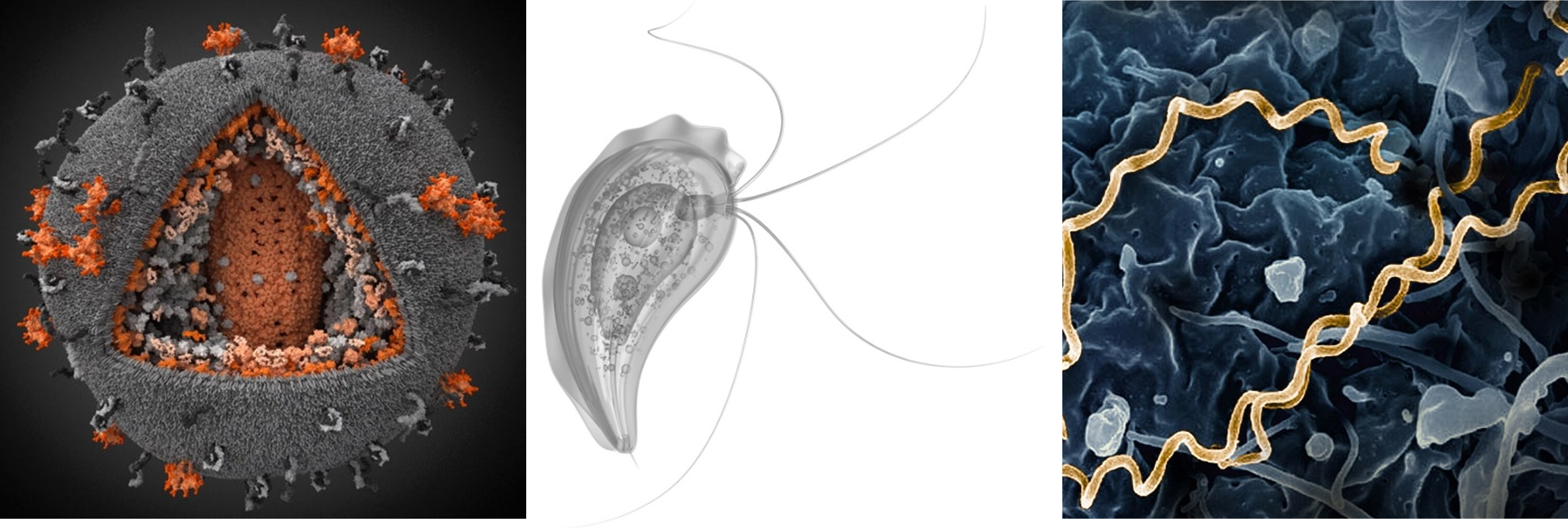Sexually Transmitted Infections

Sexually Transmitted Infections (STI) have been a public health concern for centuries, dating back in history where stories were shared of people dying from syphilis or even the “clap”. STIs continue to be a major public health concern and are the major causes of infertility and cervical cancers. The rise in antimicrobial resistance in some of these diseases only increases the threat to public health. In a 2021 report by the Centers for Disease Control and Prevention (CDC), Delaware ranked 24th in Chlamydia cases at 486.4 per 100,000 population. In the same report Delaware was 33rd in Gonorrhea cases (153.6 cases per 100,000 population). Read the CDC report-Reported STDs in the United States, 2021.
Syphilis
Syphilis is a highly contagious, bacterial infection caused by Treponema pallidum. If left untreated, T. pallidum can cause serious, life-threatening complications. Initial infection presents as firm, round, painless sores, called chancres, that can last 3 to 6 weeks. Untreated syphilis progresses through various stages, from a non-itching rash, followed by a latent (inactive) period for many years, and after 10 to 30 years can progress to a systemic infection damaging organs and possibly resulting in death. During any stage, untreated syphilis can spread to the brain and nervous system causing Neurosyphilis.
The Delaware Public Health Laboratory (DPHL) uses a reverse testing algorithm, endorsed by the CDC, for syphilis serology screening. This testing algorithm incorporates the use of two laboratory serologic test methods: a nontreponemal test and a treponemal-specific test. Both methods are required for a presumptive syphilis test result. Nontreponemal test methods for serum and plasma include an automated Treponema pallidum (TP) assay and a rapid plasma reagin (RPR) screening test.
Specific treponemal antibody tests utilized by DPHL includes the Treponema pallidum particle agglutination (TP-PA) test. Positive titer results can be an indicator for disease progression and to assist in responses to treatment options.
Evaluation of cerebrospinal fluid (CSF) for individuals suspected to have neurosyphilis is also performed at DPHL by use of the Venereal Disease Research Laboratory (VDRL) test. While no single test can be used to diagnose every instance of neurosyphilis, the presence of neurological signs or symptoms with a reactive CSF VDRL are considered diagnostic of neurosyphilis.
HIV and Hepatitis C
DPHL uses a fourth generation Antigen/Antibody Immunoassay test for the early detection of Human Immunodeficiency Virus (HIV) infection. This testing method can detect HIV infection as early as seven days post infection. Confirmation and differentiation of HIV-1 and HIV-2 are available using an immunochromatographic assay.
DPHL also performs screening by immunoassay for Hepatitis C Virus. Viral load quantification is performed by real-time transcription-mediated amplification (TMA). Viral load quantification values do not discriminate between acute and chronic infection states.
Gonorrhea, Chlamydia and Trichomonas
DPHL performs DNA amplification testing for the detection of Gonorrhea, Chlamydia and Trichomonas by way of an automated laboratory system from clinical specimens. DPHL has validated various sources for detection of Gonorrhea and Chlamydia including oral/rectal sources as well as urine, vaginal, urethral and cervical swab.
Herpes Simplex Virus I & II (HSV) and Varicella Zoster Virus (VZV):
DPHL performs molecular testing for Herpes Simplex Virus (HSV) and Varicella Zoster Virus (VZV). HSV, known as herpes, is a common infection causing painful blisters or ulcers that is treatable, but not curable. There are two types of herpes simplex virus. Type 1 (HSV-1) mostly spreads by oral contact and causes infections in or around the mouth (cold sores) and may also cause genital herpes. Type 2 (HSV-2) spreads through sexual contact and causes genital herpes. VZV is an alpha herpes virus that causes chickenpox and herpes zoster (shingles).
Tests Offered:
Syphilis serology:
- Treponema pallidum (TP) Assay- IgM & IgG qualitative antibody detection
- RPR screening test, Qualitative and Quantitative
- TPPA (confirmatory test)
- VDRL, Qualitative and Quantitative (cerebral spinal fluids only)
Human Immunodeficiency Virus (HIV):
- 4th Generation Antigen/Antibody Immunoassay Detection
- HIV 1 and 2 Differentiation Immunoassay Confirmation
Hepatitis C Virus (HCV):
- HCV Antibody Immunoassay Detection
- HCV Viral Load – Quantitative
Chlamydia, Gonorrhea and Trichomonas:
- Nucleic Acid Amplification Testing (NAAT)
- Gonorrhea Culture
Herpes Simplex Virus I & II and Varicella Zoster Virus (VZV):
- Multiplex PCR Assay
Click here for Specimen Collection Procedures and Forms
Use the following links for more information on:
APHL Programs/Infectious Diseases
Return to the Delaware Public Health Laboratory home page.
This page was last updated 4/24
![]() Please note: Some of the files available on this page are in Adobe PDF format which requires Adobe Acrobat Reader. A free copy of Adobe Acrobat Reader can be downloaded directly from Adobe . If you are using an assistive technology unable to read Adobe PDF, please either view the corresponding text only version (if available) or visit Adobe’s Accessibility Tools page.
Please note: Some of the files available on this page are in Adobe PDF format which requires Adobe Acrobat Reader. A free copy of Adobe Acrobat Reader can be downloaded directly from Adobe . If you are using an assistive technology unable to read Adobe PDF, please either view the corresponding text only version (if available) or visit Adobe’s Accessibility Tools page.



